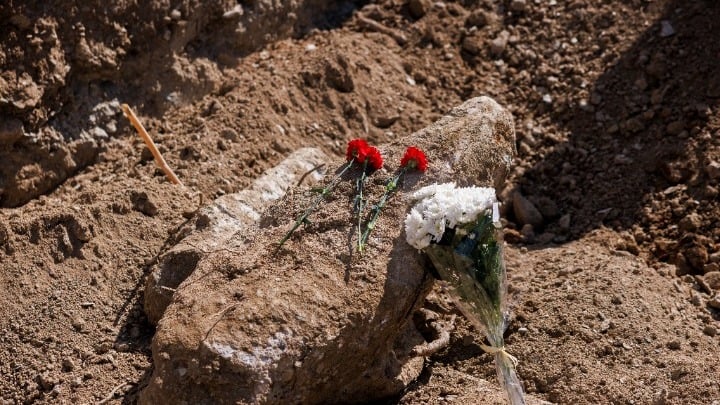

Another series of unmarked graves containing 14 executed individuals from Greece’s civil war era, have been uncovered under a park in a suburb of Thessaloniki, in northern Greece, local officials said Saturday
The bodies, according to historians, belong to prisoners who were held in a nearby Byzantine fortress, known as Genti Koule or Eptapyrgio (“seven towers”) in Greek. As alleged communists and sympathizers, they were executed between 1946 and 1953.
In March, another cluster of unmarked burial bits was excavated in the Neapolis-Sykies district of Thessaloniki, also belonging to executed civil war prisoners.
The graves were uncovered on the site of a municipal park undergoing renovation, including the installation of new benches. Haris Charismiadis, the supervising engineer of the park project, told the Associated Press that the burial pits were not far beneath the surface. He added that most of the current batch of bodies were found during the past week. He is certain there are more bodies buried nearby, including, probably, under the tarmac of streets adjacent to the park.
Thessaloniki mayor Simos Daniilidis said the renovation project is not currently a priority and that instead “we insisted on continuing the digging for the graves.”

Two mass graves containing the remains of executed individuals from the Greek Civil War had been discovered in the Sykies district of Thessaloniki in March.
The graves were uncovered during redevelopment work around the National Resistance Memorial, increasing the total number of such sites in the area to six.
According to experts, the location was likely used for the execution of political prisoners due to its proximity to the Genti Koule prison, a Byzantine and Ottoman-era fortress situated on the north-eastern corner of the Acropolis of Thessaloniki.
The first human remains were found in late 2024. Although the antiquities authority determined that the skeletons were not of archaeological interest, municipal authorities requested further excavations, citing their historical and political significance.
At least 22 skeletons had been unearthed, one of which was believed to belong to a woman, as traces of a woman’s shoe were found. Additionally, four or five skeletons appeared to belong to individuals around 20 years old.
Most of the remains had been handed over to authorities for further examination, including age estimation and determination of the time period in which the executions took place.
Municipal authorities had also requested the return of the skeletons so they can be made available to relatives and descendants for potential DNA identification.
The Greek Civil War was a conflict that took place from 1946 to 1949, immediately following World War II. It was primarily fought between the Greek government, supported by the United States and Great Britain, and the Democratic Army of Greece (DSE), which was backed by communist Yugoslavia, Bulgaria, and Albania.
The civil war was marked by brutal fighting, atrocities committed by both sides, and significant civilian suffering. It ended with the defeat of the DSE in 1949, leading to the establishment of a conservative government in Greece. The conflict also had broader implications during the early stages of the Cold War, as it was seen as part of the ideological struggle between communism and Western democracy.
Thousands of people were killed during the Greek Civil War which left deep scars on Greek society, contributing to political polarization for decades.
